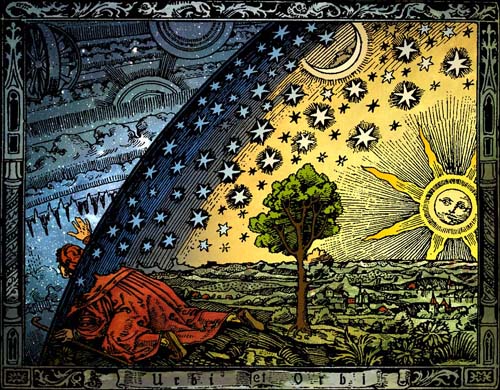
The Aether is an old concept much revised. Originally from the Greek, it was a personification of the sky or heavens above. Later, in the middle ages it was the nesting crystal spheres that carried around the planets and stars in their orbits. Newton, amonst others, used the concept of the Aether to explain how light and heat might propogate through space - if regarded as waves (as some experiments seemed to show), then there must be then a medium which filled all of space, and that medium was "The Aether".
The very famous Michelson-Morley Experiment disproved the existence of the aether ironically by attempting to measure the "aether wind" the earth must create in its orbit about the sun. No aether wind was detected.
Now the aether was an important idea. It explained how the stars and planets kept their place in the sky. (They were suspended within crystal spheres). It explained how light and heat could travel across the vacuum of space (Aether is the medium through which they travel). But as we've been unable to detect it's presence the concept of an "aether" has fallen out of repute.
Or has it? Perhaps it has just been renamed.
By which I refer to the concepts of Space and Time - which provide many of the new "answers"the old aether used to. Or there's Dark Matter, which must fill the void of space to make our current view of the universe work. The problem no longer hinges on the propping of the stars up in the heavens, or the propogation of waves through space, now it hinges on one of gravitation - there's not enough observable matter in the unverse to account for the behaviour of stars, galaxies, etc. Dark Matter is postulated to be filling in the void. The problem with this is that we have no direct evidence of this dark matter, despite theories which state it must account for approximately 90% of the mass in the universe. For something of which we have no proof whatsoever there are an awful lot of theories and convoluted calculations that presuppose it's existence.
So the aether survives.
Now there is something about these theories I like to call the "Fudge Factor". It's where we presuppose the existence of something in order to explain the results we get. For example, I'm not rich, hence I can assume (presuppose) that God doesn't want me to be rich. Now we laugh, because I'm using an imaginary concept (God) to explain circumstances that might somehow be explainable by other means. We're too enlightened for my arguments. And, truth be told, the idea that "God" is to blame for anything is laughable. But it raises the question - why do we then allow for these sorts of explanations in science? "Dark Matter" is a very much accepted idea amongst scientists, despite the lack of evidence, because it allows them to explain things that otherwise would be too difficult or problematic.
So there's a similarity here, between science and religion, that the cult of science wouldn't be too comfortable acknowledging. It's not the only one - there is as well the thought of the Cosmological constant, first created by Einstein to create a steady-state universe, now borrowed by physicists to explain the accelerating universe. And if you try you'll find there are others.





















